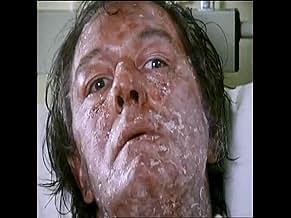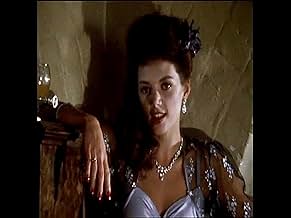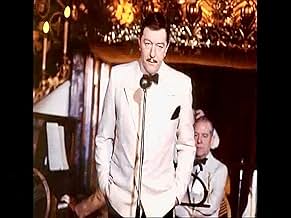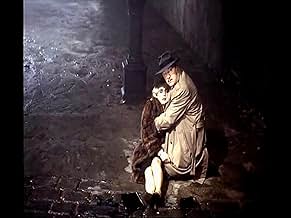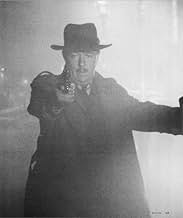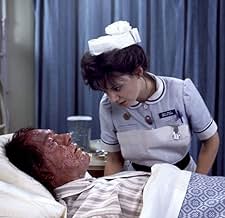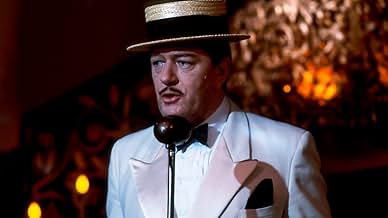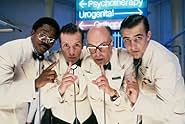The Singing Detective
- टीवी मिनी सीरीज़
- 1986
- 1 घं 10 मि
IMDb रेटिंग
8.5/10
5 हज़ार
आपकी रेटिंग
अपनी भाषा में प्लॉट जोड़ेंTormented and bedridden by a debilitating disease, a mystery writer relives his detective stories through his imagination and hallucinations.Tormented and bedridden by a debilitating disease, a mystery writer relives his detective stories through his imagination and hallucinations.Tormented and bedridden by a debilitating disease, a mystery writer relives his detective stories through his imagination and hallucinations.
- 3 BAFTA अवार्ड जीते गए
- 6 जीत और कुल 8 नामांकन
एपिसोड ब्राउज़ करें
फ़ीचर्ड समीक्षाएं
10jimi99
There's no question that the greatest films of the past 25 years have been TV miniseries, from "I Claudius" to "The Decalogue" to "Nicholas Nickleby" to "The Singing Detective." The ability to stretch out over 6 to 10 hours is certainly a key to doing justice to a theme or great work of literature.
"The Singing Detective" is a bold, multileveled BBC series that is made all the more powerful considering that it is based on the author Dennis Potter's losing battle with a skin disease combined with his incredibly rich fantasies, painful memories, and writer's imagination, all rolled into one complex narrative. Over the 6-hour span, his life and personality, as portrayed by the brilliant Michael Gambon as the writer/novel protagonist Philip Marlow (without the "e"), is revealed inventively and poignantly. We sympathize with his wasting disease, admire his clever mind, and see all his hang-ups and "sins" gradually bared to his audience. It is an amazing swan song for a brutally self-honest writer.
Jon Amiel's direction is impeccable, and the whole production is uncompromising regarding sex, nudity, language and emotional pain. The famous musical numbers featuring not only Philip and his father in the past, but projected onto the patients and staff of the hospital ward where the "real" present action takes place, are so integral to the story that they are a perfect reflection of Philip's tenuous grip on reality.
The forthcoming Keith Gordon feature film, no matter how inventive and bizarre it is, must fail artistically and be suspected of dishonoring the essence of the story, Dennis Potter's autobiography. It will probably succeed financially with the casting of Downey and Gibson, but please find the BBC series at your local library and enjoy this masterpiece.
"The Singing Detective" is a bold, multileveled BBC series that is made all the more powerful considering that it is based on the author Dennis Potter's losing battle with a skin disease combined with his incredibly rich fantasies, painful memories, and writer's imagination, all rolled into one complex narrative. Over the 6-hour span, his life and personality, as portrayed by the brilliant Michael Gambon as the writer/novel protagonist Philip Marlow (without the "e"), is revealed inventively and poignantly. We sympathize with his wasting disease, admire his clever mind, and see all his hang-ups and "sins" gradually bared to his audience. It is an amazing swan song for a brutally self-honest writer.
Jon Amiel's direction is impeccable, and the whole production is uncompromising regarding sex, nudity, language and emotional pain. The famous musical numbers featuring not only Philip and his father in the past, but projected onto the patients and staff of the hospital ward where the "real" present action takes place, are so integral to the story that they are a perfect reflection of Philip's tenuous grip on reality.
The forthcoming Keith Gordon feature film, no matter how inventive and bizarre it is, must fail artistically and be suspected of dishonoring the essence of the story, Dennis Potter's autobiography. It will probably succeed financially with the casting of Downey and Gibson, but please find the BBC series at your local library and enjoy this masterpiece.
10adam_12
"The Singing Detective" very well may be the best thing done on television. Gambon is outstanding as the lead role, Marlow; he takes command of the performance so that you the viewer see Gambon as Phillip. The story is so rich and detailed with psychological questions that Marlow reflects on from his hospital bed; as you see him find resolutions to his questions, his skin condition becomes better. In the flashbacks, as he has more problems, it becomes worse. This is just one of many predicaments that Marlow faces throughout his time in his life. The story asks psychological questions about childhood, humans as sexual beings, the existence of God, and the healing (and destroying) powers of the mind. "The Singing Detective" is a quite cerebral and a brilliant show. SEEK THIS SERIES OUT and treasure it!
This is Dennis Potter's 'Sergeant Pepper' - the work of his life. One of those times when the recurring themes and characters from an artist's collected works come together at the right moment, with the right direction and the right actors.
The story is simple - embittered, sarcastic, over-the-hill author is admitted to hospital with a highly disfiguring skin condition. Whilst lying virtually helpless in his bed, he begins to rewrite one of his pulp novels (The Singing Detective) and to reminisce on his childhood in the Forest of Dean and London. But the memories and fiction start to overlap, with some hallucinations thrown in for good measure!
In the hands of lesser mortals, this could have been a disaster (I fear for the 2003 remake. Robert Downey Jr?!). But the direction of Amiel and the acting of the entire cast are outstanding. Michael Gambon is stunning as the (initially) sour and downright nasty Marlowe. That we sympathise with him given all of his shortcomings is testament to this.
The subtext is of a man exorcising his demons and coming to terms with his guilt: guilt about the death of his mother, guilt about his treatment of the women in his life, guilt about his victimisation of a schoolmate.
One of those films that is like a giant jigsaw - at first what appear to be a random collection of unrelated images which are rearranged, flipped over and pieced together. Ultimately we are presented with solutions to everything - almost.
After all, not everything has a solution...
The story is simple - embittered, sarcastic, over-the-hill author is admitted to hospital with a highly disfiguring skin condition. Whilst lying virtually helpless in his bed, he begins to rewrite one of his pulp novels (The Singing Detective) and to reminisce on his childhood in the Forest of Dean and London. But the memories and fiction start to overlap, with some hallucinations thrown in for good measure!
In the hands of lesser mortals, this could have been a disaster (I fear for the 2003 remake. Robert Downey Jr?!). But the direction of Amiel and the acting of the entire cast are outstanding. Michael Gambon is stunning as the (initially) sour and downright nasty Marlowe. That we sympathise with him given all of his shortcomings is testament to this.
The subtext is of a man exorcising his demons and coming to terms with his guilt: guilt about the death of his mother, guilt about his treatment of the women in his life, guilt about his victimisation of a schoolmate.
One of those films that is like a giant jigsaw - at first what appear to be a random collection of unrelated images which are rearranged, flipped over and pieced together. Ultimately we are presented with solutions to everything - almost.
After all, not everything has a solution...
The Singing Detective is one of those great works that inspire something deep within the viewer, leaving them both shaken and elated by the spectacle they have just witnessed. Few cinematic works can inspire such a feeling, let alone a work for television; and it is this sense of genius that elevates this work above the comparatively "okay" likes of say, Cracker, Brideshead Revisited, and Prime Suspect et al. This is down to the fact that The Singing Detective is a work far greater than anything else; a microcosm of life, love, anger, defeat, consciousness and the sub-conscious. It deals with the intricate realms of fantasy and reality, the written, the understood and the real. If this sounds complicated then we're on the right track, because this is one of Dennis Potter's most detailed narrative constructs. The story chronicles a writer's decent into personal hell, as well as a decent into a book being written in his own imagination and a book written many years before; with his past, present and future all jostling for our attention throughout the epic, six-hours-plus running-time.
It is a testament to Potter's ability as a screenwriter that the whole thing zips along so quickly, with the multi-layered story never pausing for a moment; constantly being carried along at every step by the combined genius of Potter's characters, the skillful and visually rich direction of Jon Amiel and that towering central performance from the brilliant Michael Gambon. The writing is truly ecstatic, with Potter obviously relishing every chance he gets to play with both the musical and detective-movie clichés - bringing to mind both Casablanca and Potter's own-classic Pennies From Heaven - whilst the dialog of Gambon's inner-monologues have more in common with the profane poetry of 60's playwrights that anything you'd expect to hear on BBC 2. The story also has obvious political overtones, with Potter using the hospital setting of the present sequences to double as an allegory of 80's Britain under the tyrannical leadership of Margaret Thatcher (bringing to mind the Elvis Costello song Tramp the Dirt Down and those other hospital set political parables, One Flew Over the Cuckoo's Nest and Britannia Hospital).
The story is also somewhat semi-autobiographical from Potter's point of view, with the writer, at this point in time, suffering from the same psoriatic-arthritis that Gambon's character Marlow has (creating that devastating, iconic image of the paralytic Marlow languishing half-naked in bed, being greased by a young Joanne Whally). There are also the much deeper autobiographical aspects with the young Marlow's childhood in the shady and evergreen Forest of Dean, in which the pastoral setting gives way to some truly shocking moments; recalling similar childhood traumas from such diverse examples as Iain Bank's Complicity and Rob Reiner's film Stand by Me. However, within this mire of bitterness, surrealism, bouts of lip-synced cabaret and phantasmagorical shoot-outs, there is also a great deal of humour. Anyone who has seen one of Potter's early TV plays or, for that matter, later classics like Karaoke and Cold Lazarus will know of his depth and range as both a humorist and a satirist; and it is this darkly acerbic wit that underlines the central narrative strands of The Singing Detective.
Some would argue that this is the best that television has to offer, though I would politely disagree. The Singing Detective is a work of art too good to be considered simply for television. Now, thanks to the magic of DVD we have the chance to experience Potter's classic in its definitive unabridged, unedited, uninterrupted from. A truly great piece of work.
It is a testament to Potter's ability as a screenwriter that the whole thing zips along so quickly, with the multi-layered story never pausing for a moment; constantly being carried along at every step by the combined genius of Potter's characters, the skillful and visually rich direction of Jon Amiel and that towering central performance from the brilliant Michael Gambon. The writing is truly ecstatic, with Potter obviously relishing every chance he gets to play with both the musical and detective-movie clichés - bringing to mind both Casablanca and Potter's own-classic Pennies From Heaven - whilst the dialog of Gambon's inner-monologues have more in common with the profane poetry of 60's playwrights that anything you'd expect to hear on BBC 2. The story also has obvious political overtones, with Potter using the hospital setting of the present sequences to double as an allegory of 80's Britain under the tyrannical leadership of Margaret Thatcher (bringing to mind the Elvis Costello song Tramp the Dirt Down and those other hospital set political parables, One Flew Over the Cuckoo's Nest and Britannia Hospital).
The story is also somewhat semi-autobiographical from Potter's point of view, with the writer, at this point in time, suffering from the same psoriatic-arthritis that Gambon's character Marlow has (creating that devastating, iconic image of the paralytic Marlow languishing half-naked in bed, being greased by a young Joanne Whally). There are also the much deeper autobiographical aspects with the young Marlow's childhood in the shady and evergreen Forest of Dean, in which the pastoral setting gives way to some truly shocking moments; recalling similar childhood traumas from such diverse examples as Iain Bank's Complicity and Rob Reiner's film Stand by Me. However, within this mire of bitterness, surrealism, bouts of lip-synced cabaret and phantasmagorical shoot-outs, there is also a great deal of humour. Anyone who has seen one of Potter's early TV plays or, for that matter, later classics like Karaoke and Cold Lazarus will know of his depth and range as both a humorist and a satirist; and it is this darkly acerbic wit that underlines the central narrative strands of The Singing Detective.
Some would argue that this is the best that television has to offer, though I would politely disagree. The Singing Detective is a work of art too good to be considered simply for television. Now, thanks to the magic of DVD we have the chance to experience Potter's classic in its definitive unabridged, unedited, uninterrupted from. A truly great piece of work.
A search of the comments on "The Singing Detective" turned up only one mention of Lyndon Davies, who played Philip Marlow aged 10. His performance of this really central character was truly remarkable, and it was essential to establishing the basis for the adult Marlow's problems.
It is amazing that a 10-year-old could play the part, which required, among other things, mastering the country dialect, and showing emotional states so convincingly. Probably John Amiel's direction was an important factor in Lyndon's performance -- as well as that of the other children -- but it was really up to Lyndon's talent to bring it off.
Thanks, Lyndon Davies!
It is amazing that a 10-year-old could play the part, which required, among other things, mastering the country dialect, and showing emotional states so convincingly. Probably John Amiel's direction was an important factor in Lyndon's performance -- as well as that of the other children -- but it was really up to Lyndon's talent to bring it off.
Thanks, Lyndon Davies!
क्या आपको पता है
- ट्रिवियाThe first time Sir Michael Gambon was wheeled onto set in his full make-up, all the cast and crew were reduced to a stunned silence. Gambon broke the ice by saying "What's all this fuss about Chernobyl then? I went there for a holiday and it didn't do me any harm."
- भाव
Philip Marlow: I used to think that all I wanted was the good opinion of honorable men and the ungrudging love of beautiful women. Now I know for sure that all I really want is a cigarette.
- कनेक्शनFeatured in Arena: Dennis Potter (1987)
- साउंडट्रैकPeg o' My Heart
(uncredited)
Music by Fred Fisher
Performed by Max Harris & His Novelty Trio during the credits
टॉप पसंद
रेटिंग देने के लिए साइन-इन करें और वैयक्तिकृत सुझावों के लिए वॉचलिस्ट करें
- How many seasons does The Singing Detective have?Alexa द्वारा संचालित
- How do I get to watch jt
विवरण
इस पेज में योगदान दें
किसी बदलाव का सुझाव दें या अनुपलब्ध कॉन्टेंट जोड़ें



